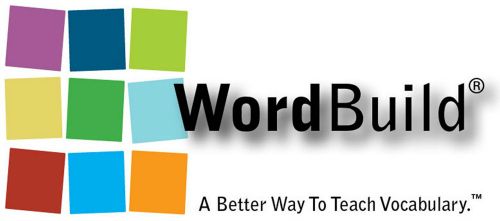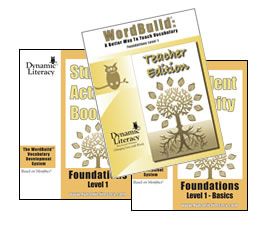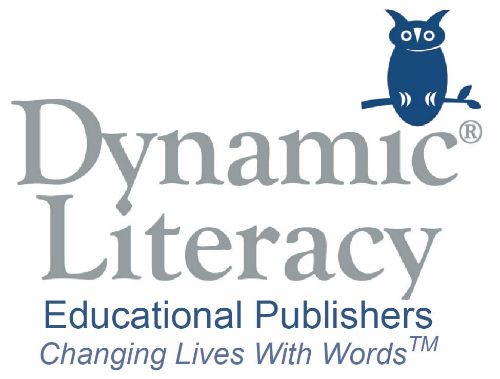 |
| Looking for the coupon code? Scroll down to "Learn More"! |
My children wow me daily with their expressive vocabulary. So, why would I ever choose to review a vocabulary-building curriculum called WordBuild: Foundations, Level 1 by Dynamic Literacy? Because I believe in the old adage, "You can give a man a fish and feed him for a day. Or, you can teach him how to fish and feed him for a lifetime."
Daily, I offer my children a smorgasbord of vocabulary through reading quality literature aloud to them, as well as through encouraging the one who can independently read to do so within his own interests to his heart's content. Often, as we read aloud, and sometimes as my oldest reads to himself, new words become naturally assimilated into my kiddoes' working vocabulary. At other times, one or the other of my children asks, "Mommy, what does (fill-in-the-new-word) mean?"
Of course, I love when my children ask about words and happily answer their questions. However, in doing so, I tend to "feed them for the day", rather than "teaching them how to fish". I offer my children synonyms, definitions, examples and more, but, admittedly, rarely help them break down the words into meaningful morphemes (or core prefixes, suffixes and roots). Thus, I do not give them the tools to unlock the meaning of more than 16,000 words. WordBuild does!
What is WorldBuild: Foundations?

WordBuild: Foundations, Level 1 is a proven way for children at a grade three through five level to quickly develop strength in word comprehension. As the the first in a series of vocabulary products designed to help students in third grade through college age, it can also successfully be used with remedial and English Language Learners in grades five through nine.
Using a systematic rotation of puzzles, games and other activities, Foundations was designed as a result of more than thirty years of research on the evolution of language and best practices in teaching vocabulary. It has been proven to engage students and to get results. It:
- does NOT contain word lists to memorize, but teaches children how to build and break down words using morphemes (or word parts).
- focuses student learning on the most frequently used prefixes, roots and suffixes used in the English language.
- lays foundation in teaching students the 93 Latin and Greek roots that comprise 75% of the words use in academic English.
- builds upon children's prior knowledge by having them attach target morphemes to words they already know, thereby exponentially increasing their working vocabulary.
And, it does all this in about 15-minutes a sitting!
Our Experience

Four our review, we received via post:
- The WorldBuild: Foundations Level 1 Teacher Edition includes 256 pages of day-by-day lesson plans, which are broken into 5-day units that quickly and clearly explain what to teach, complete and discuss each teaching day and which provide answer keys, teaching tips, periodic tests and more. The Teacher Edition also contains a helpful 10-page appendix of compound word lists and a 2-page final "check up" quiz.
- The Basics Student Activity Book, which is a 20-page, full color workbook that uses pictures to introduce students to compound words and, then, transitions them into prefixes and suffixes in a gentle, graphic manner.
- The Foundations Level 1 Student Activity Book, which contains 184 pages that cover 30 prefixes, suffixes, and combinations presented in Affix Square, Affix Adder, Magic Square, Word Search and fill-in-the-blank workbook pages. It works more than just vocabulary. It also works spelling with units on such things as the double letter principle and the dropped 'e' convention.
 |
| The first day using Foundations was easy-peasy and engaging. |
Because my nine-year-old has had little prior practice with formal learning about compound words, prefixes and suffixes, I decided to begin our 15-minute and under sessions with The Basics Student Activity Book. Using suggestions from the Teacher Edition as a guide, we quickly got to work. My son does not typically enjoy workbooks, but did not balk much about this one. He completed the first few pages with little guidance and relative ease. All was going swimmingly until...
The activity book disappeared!
To this day, despite searching, none of us in our home know where it went. We suspect that in an overzealous 10-minute tidy one day it got shuffled into our paper recycling bag and donated to a local recycling bin. Oh no! (Both my son and I liked that book!)
Not to be too chagrined, I let my son know that I thought he had been doing so well with the Basics Activity Book that he could probably tackle the next level without much trouble. I would sit next to him as he did in case he felt in over his head. He agreed. And guess what?
The Foundations Level 1 Activity Book was not over his head at all! He actually did more than one page in some of his 15-minute sessions with it. In fact, the only things he needed me for was:
- to write his definitions on the Prefix Square page because his handwriting was too big to do so himself after he had written the words he'd constructed from the square:
- to remind him to remember capital letters and periods on the Affix Adder pages, which he actually got quite into making sentences for and did not want my help with (as shows in his spelling!)
- to show him how to add up the numbers on the Magic Square page so he could check his own work. (I like that the program includes some basic addition practice, too!)
- to say, "It's okay, you don't need to finish now" when our timer went off while he did the Word Search page, because, although he was into the word search, we had somewhere we had to be getting going to that day.
- to listen as he did the fill-in-the-blank page orally, because I felt the blank lines were a bit short for him to write complete words on.
And so we were off to a good start which has continued. Each subsequent unit of work in the activity book has followed the same pattern with different affixes and root words. Each page has been completed in 5-15 minutes. My son has stayed fairly engaged, but also has sometimes been "bored" by the repetitive nature of the activity presentation. (As I said, he is not a "workbook kid". Also, because we do a wide variety of experiential learning activities and games, "systems" sometimes get old quickly for him.) Thus, I found myself, at times, allowing him to pick just one or two pages of each unit of work to complete or doing portions orally.
That said, I am glad we have been using the program. Even though my son has strong expressive vocabulary, Foundations is serving the main purpose I thought it would for us. It is teaching my son to be a fisher of words. Since we began the program, we have paused during read aloud times to point out affixes he'd focused on in the Activity Book to his siblings. I have also noticed him taking more care with his word attack when spelling and with his decoding and meaning-gleaning when reading on his own.
My Bottom Line
If you have a child who is not 100% workbook-opposed and who has also finished mastering phonics, Foundations could be an ideal tool for helping him move beyond "sounding out" words and into "meaning" them out. It can help not only with word comprehension, but also with spelling, and it can do so in an engaging, systematic way that lays the foundation for unlocking a huge portion of English words.
Strengths of the program include that:
- the Teacher Edition was quite well laid out and easy-to-follow with objectives, hints, needed materials, week-at-a-glance chars, discussion ideas and more. While some Teacher Editions, I think, are superfluous, this one, I think, is a true help!
- there is some variety. The games and puzzles keep children engaged in learning, even if my particular child could use even more variety in them.
- learning is incremental - steady but quick. Material is presented in bite-size pieces that allow children to quickly digest it. With three roots and three prefixes, children can learn 12 words. Then, add three suffixes and they've got 48 words. Three more roots and that's 96 words...
Potential pitfalls of it, depending on the parent and child might be:
- The course appears to be originally designed for a classroom and, therefore, can seem a bit dry and repetitive at times. Likewise, depending on the speed with which your child masters materials and their interest in such things as word searches, some pages of the activity book may seem like "busy work". The easy fix for this is simply to skip such pages.
- Printables to make compound word dice are found in the first lessons, but further lessons do not include such fun options for kinesthetic learners. I am fully able to create such things on my own, but I would still love to see more suggestions for multi-sensory, active learning within later lessons of the Teacher Edition or as an appendix. There are so many active, fun ways to move beyond pen-and-paper and discussion when learning how to break down and piece together new words. Layering some of these into the solid existing cycle of pen-and-paper activities and games would make Foundations even more dynamic!
Learn More (and Use A Coupon Code!)
- Use the coupon code happyhearts at checkout for 25% off books on www.dynamichomeschool.com or 10% off www.wordbuildonline.com.
- Download a sample of WordBuild: Foundations, Level 1.

- Read what 85 Schoolhouse Review Crew families think about Dynamic Literacy's WordBuildOnline, WordBuild: Foundations, Level 1, and WordBuild: Elements, Level 1.
How might you feed your children's ability to "mean" out words for a lifetime?






